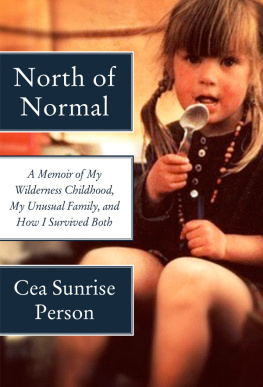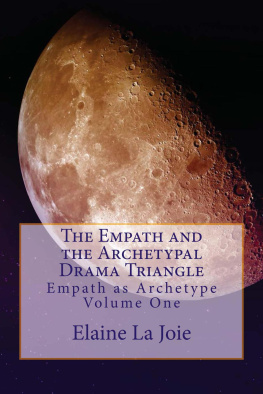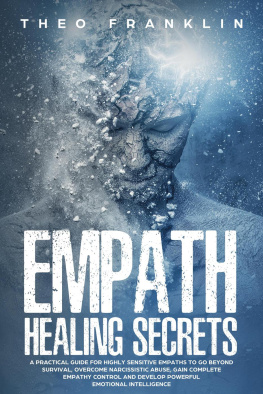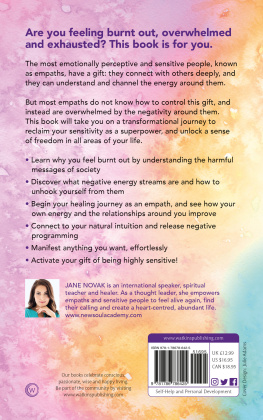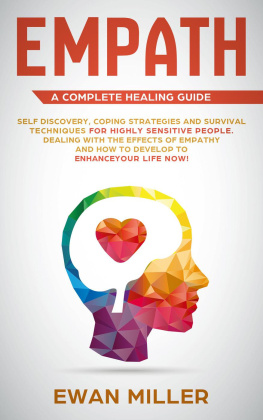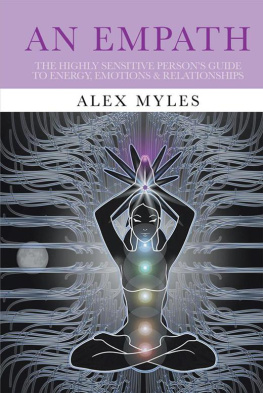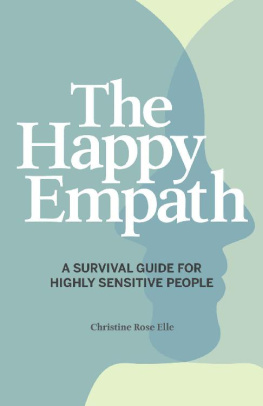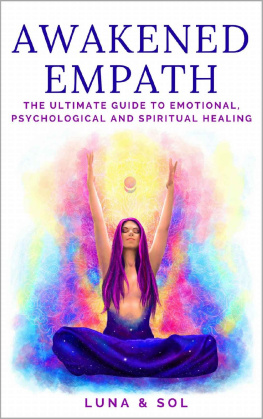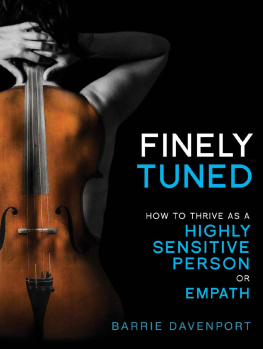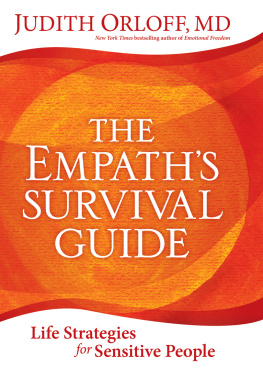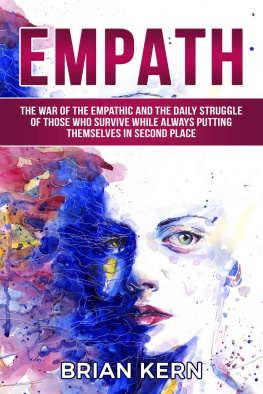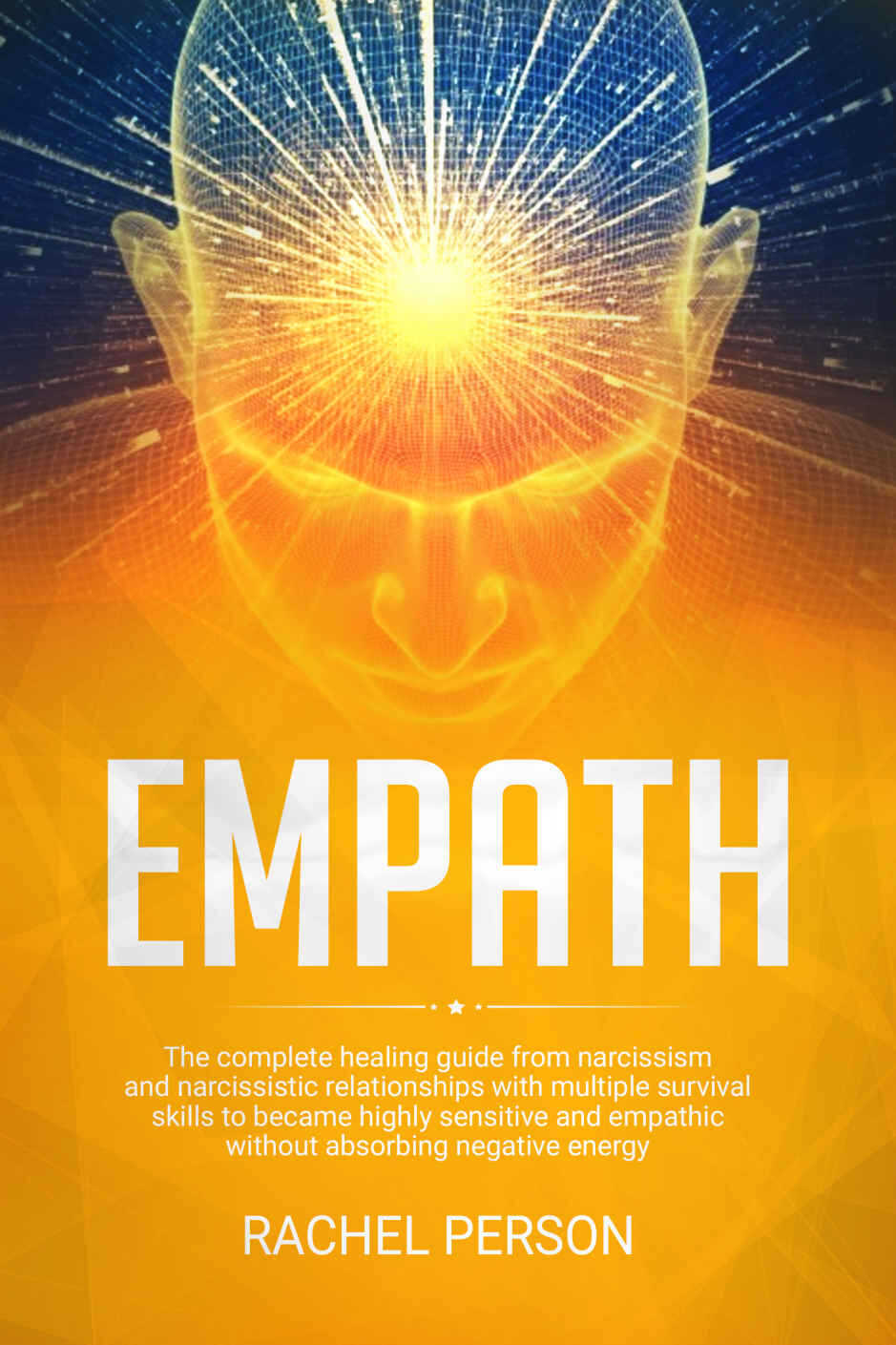EMPATH
The complete healing guide from narcissism and narcissistic relationships with multiple survival skills to become highly sensitive and empathic without absorbing negative energy
Copyright 2019
All rights reserved. This book or any portion thereof may not be reproduced, stored in a retrieval system, or transmitted in any form, or by any means, without the prior express permission of the publisher, except for the use of brief quotations in a book review. Any person who commits any unauthorized act in relation to this publication may be liable to criminal prosecution and civil claims for damages.
TABLE OF CONTENTS
INTRODUCTION
Congratulations on purchasing Empath, and thank you for doing so.
The following chapters will discuss what an empath is, what a narcissist is and the difference between the two.
There are plenty of books on this subject on the market, thanks again for choosing this one! Every effort was made to ensure it is full of as much useful information as possible, please enjoy!
CHAPTER 1:
WHAT IS EMPATHY? WHAT IS NARCISSISM?
Behavioral differences between the two?
The term Empathy may be used to cover a full range of experiences we have which deal with our emotions and our ability to sense other peoples emotions and overall behavioral patterns. When we combine this observation with our ability to get a sense of what other individuals are thinking or how they may be responding to a stimulus or outside influence, we have empathy towards that person. For some individuals, this also includes a sense of passion for animals.
Most researchers agree that the study of empathy could be contained within 3 general types or descriptions. These are as follows:
Cognitive empathy
Emotional empathy
Compassionate empathy
Researchers also generally agree that it is possible for an individual to possess or demonstrate one or more of these three types of empathy and still appear to others around th em as uncaring or unaffected.
Cognitive Empathy:
This type of empathy is widely viewed as our predominantly conscious drive to accurately perceive others emotional state. This is sometimes referred to as Perspective Taking.
When dealing with cogni tive empathy, the following might apply:
Concerns: thought, understanding and intellect.
Benefits: helps in negotiations, motivating other people, understanding diverse viewpoints.
Pitfalls: Can be disconnected from or ignore deep-seated emotions and does not put you in anothers shoes in a felt sense.
Cognitive Empathy is about thought as much as emotion. This is where the knowing and understanding works on an intellectual level.
So if my sister came home and her boyfriend just broke up with her making he r very sad, I would feel sad as well and try to comfort her. I would mirror her emotion. Similarly, when a doctor inspects an ill patient, he attempts to comprehend the components of the illness and not the patients reaction to being sick.
So cognitive e mpathy responds to a problem in a cerebral manner. To understand emotions in terms of how they work in a mental way to individuals in different situations. We must ask, would you not need to feel the emotions and feelings yourself to truly understand them? The reaction to situations and problems using cognitive empathy often seem distant or remote.
Emotional Empathy:
This type of empathy, which is sometimes referred to as affective empathy or primitive empathy, is intuitive state which is automatic w ithin us. We are often driven to respond accordingly to other peoples emotional states. When faced with this phenomenon, we often react unconsciously.
By definition, emotional empathy tells us that when we physically feel along with somebody else, a s though their emotions were contagious.
Concerns: feelings, physical sensation, mirror neurons in the brain.
Benefits: Helps in close interpersonal relationships and careers like coaching, marketing, management and HR.
Pitfalls: Can be overwhelming, or inappropriate in certain circumstances.
Emotional Empathy is a lot like its name. It involves directly feeling the emotions that another person is feeling. Youve probably heard of the term empath, meaning a person with the ability to fully take on the em otional and mental state of another. The quote that comes to mind is: I have a lot of feelings.
To respond as such, one may appear disconnected from the thinking part of the brain, but emotional empathy is a deep-seated mirror neuron type of empathy. The fact is that all mammals have neurons that fire in an exact and well-known manner when they see other mammals. They mimic each other in reaction to a condition or situation.
This type of empathy could be seen as actually quite confidential and can give us feelings of closeness as though we form a very strong bond. When somebody in our presence suddenly gets a hard hit in the head, it pulls on our response strings. This can be seen in the psychological exhaustion that leads to burnout. Feeling too much can make even small interactions overwhelming.
Compassionate Empathy:
When you enter into an environment where there are other people, first, you will see them, and then your mind will begin to form impressions, evaluations, and feelings in general for each person. There is no escaping this phenomenon as this is the way we are all built. This is how we all interact with each other. This is very normal and it is an exceptionally good thing! If you enter a room where there is only one other individual, or an individual enters a room where you are alone, this will be on a more intensified and heightened scale.
For instance, if an individual enters a room and it is only the two of you, you will key on that persons behavior, you will notice their mannerisms and gestures, the way they move, and especially, their speaking. What they say will become of the utmost importance to you and often, you will not even know why.
All these expressions on the part of that person trigger your own emotions and man ifest into what is commonly known as compassionate empathy. We believe that we feel what they feel, and that we feel their pain and in a general sense, this causes us to want to help them and begin to discover what is causing their pain or their discomfor t.
Empathy is the ability of people to perceive and react to the emotions of others.
This is a groundwork of both sympathy and compassion. Those without empathy or compassion, are more likely to misinterpret the feelings and emotions of others, which in turn, can cause a heightened sense of agitation and animosity in any given such circumstances.
Sympathy means you comprehend what another person is feeling, without feeling it yourself. Compassion means that these new feelings in you, have motivated yo u to take action to diminish the discomfort of another person.
Empathy is the foundation of intimacy, and is absolutely essential, when developing a good strong relationship. People simply need empathy for the longevity of their unity. Without a sufficie nt amount of empathy, our relationships cannot reach the heights possible by human interaction and may subsequently remain emotionally hollow. When this happens, the communication in the relationship will be determined largely by the simplicity of common ground and shared activities.
Also, in the absence of empathy, our interactions in our families, with our friends, and in our work place, would match those of walking on a crowded street in New York City or sitting in a crowded theatre. Can you imagine how dull and drab that would be? None of us would ever form any meaningful relationships and our awareness of those around us would measure at little or none at best. Indeed, it would be a sad and sorry condition for our human endeavor.



